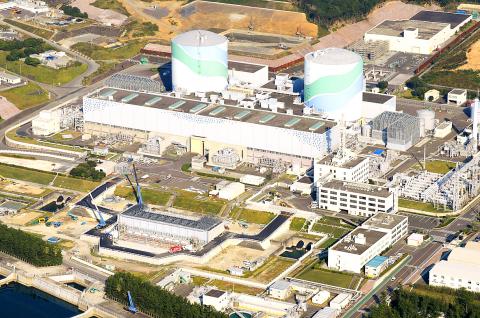Japan yesterday cleared the way for a resumption of nuclear power, four years after the world’s worst nuclear disaster in two-and-a-half decades led to the shutdown of all the country’s reactors and fueled public opposition to the industry.
Regulators said Kyushu Electric Power Co’s two-reactor Sendai nuclear plant had cleared safety hurdles introduced after a huge earthquake and tsunami triggered meltdowns and explosions at the Fukushima Dai-ichi plant in March 2011.
The Sendai plant still needs to go through operational checks before a restart, but these are expected to be completed without major hitches.

Photo: AP
The plume of radiation caused by the Fukushima disaster forced about 160,000 people from their homes, many of them never to return, in the worst nuclear disaster since Chernobyl in 1986.
The resulting closure of Japan’s reactors caused tens of billions of dollars in losses at utilities as they resorted to importing fossil fuels for power generation and paid for upgrades to meet tightened safety rules.
Some utilities decided to scrap older plants, leaving Japan with 43 operable reactors compared with 54 before the disaster.
The resumption of nuclear power is likely to be unpopular with the public after the catastrophe highlighted cosy links between utilities and the previous regulator.
The fumbled response to the meltdowns at Fukushima Dai-ichi added to the perception that nuclear power was too dangerous for such an earthquake-prone country as Japan.
Most public opinion polls have put opposition to restarts at about two-to-one, despite an average 20 percent rise in household electricity bills to cover the cost of imported fuel.
Japanese Nuclear Regulation Authority commissioners said in a televised meeting yesterday that the Sendai reactors had cleared final safety assessments. The restart has also received the approval of local authorities.
A local court last month rejected a legal bid to block the start-up by residents concerned about the plant’s vulnerability to nearby volcanoes. The residents have appealed against the decision.
Kyushu Electric hopes to restart the Sendai No. 1 reactor in late July, followed by the No. 2 reactor in late September.
The company, which reported a fourth year of losses for the 12 months through March, is desperate to restart the reactors to cut costs.
The approval came nearly two years after Kyushu Electric submitted an application for the screening. The Sendai plant won safety approval in September last year for its reactors and equipment, and was expected to be the first to restart.
Additional reporting by AP

AIR SUPPORT: The Ministry of National Defense thanked the US for the delivery, adding that it was an indicator of the White House’s commitment to the Taiwan Relations Act Deputy Minister of National Defense Po Horng-huei (柏鴻輝) and Representative to the US Alexander Yui on Friday attended a delivery ceremony for the first of Taiwan’s long-awaited 66 F-16C/D Block 70 jets at a Lockheed Martin Corp factory in Greenville, South Carolina. “We are so proud to be the global home of the F-16 and to support Taiwan’s air defense capabilities,” US Representative William Timmons wrote on X, alongside a photograph of Taiwanese and US officials at the event. The F-16C/D Block 70 jets Taiwan ordered have the same capabilities as aircraft that had been upgraded to F-16Vs. The batch of Lockheed Martin

US President Donald Trump yesterday announced sweeping "reciprocal tariffs" on US trading partners, including a 32 percent tax on goods from Taiwan that is set to take effect on Wednesday. At a Rose Garden event, Trump declared a 10 percent baseline tax on imports from all countries, with the White House saying it would take effect on Saturday. Countries with larger trade surpluses with the US would face higher duties beginning on Wednesday, including Taiwan (32 percent), China (34 percent), Japan (24 percent), South Korea (25 percent), Vietnam (46 percent) and Thailand (36 percent). Canada and Mexico, the two largest US trading

GRIDLOCK: The National Fire Agency’s Special Search and Rescue team is on standby to travel to the countries to help out with the rescue effort A powerful earthquake rocked Myanmar and neighboring Thailand yesterday, killing at least three people in Bangkok and burying dozens when a high-rise building under construction collapsed. Footage shared on social media from Myanmar’s second-largest city showed widespread destruction, raising fears that many were trapped under the rubble or killed. The magnitude 7.7 earthquake, with an epicenter near Mandalay in Myanmar, struck at midday and was followed by a strong magnitude 6.4 aftershock. The extent of death, injury and destruction — especially in Myanmar, which is embroiled in a civil war and where information is tightly controlled at the best of times —

China's military today said it began joint army, navy and rocket force exercises around Taiwan to "serve as a stern warning and powerful deterrent against Taiwanese independence," calling President William Lai (賴清德) a "parasite." The exercises come after Lai called Beijing a "foreign hostile force" last month. More than 10 Chinese military ships approached close to Taiwan's 24 nautical mile (44.4km) contiguous zone this morning and Taiwan sent its own warships to respond, two senior Taiwanese officials said. Taiwan has not yet detected any live fire by the Chinese military so far, one of the officials said. The drills took place after US Secretary